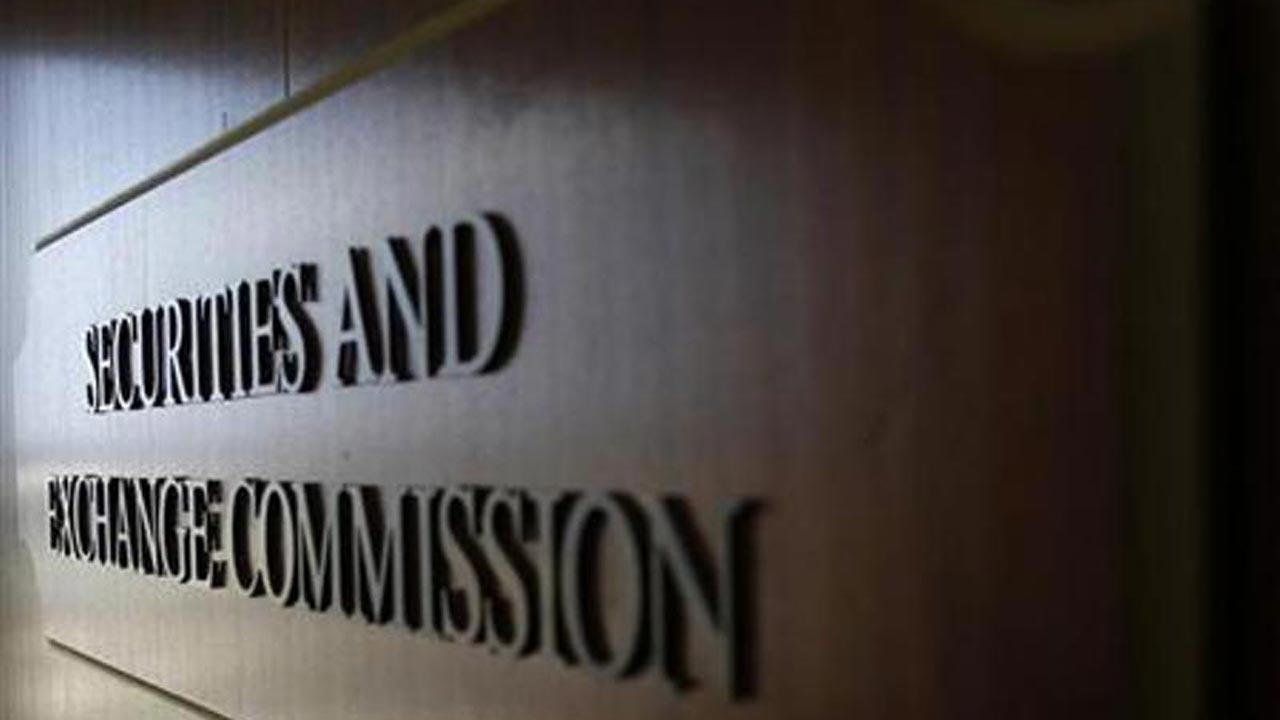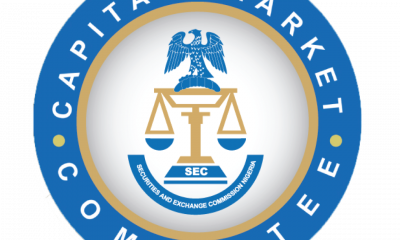Economy
Tribunal Slams N5m Fine on Four Stockbrokers

By Dipo Olowookere
Four stockbroking firms have been ordered to pay the sum of N5 million as fine for engaging in illegal transactions.
The four stockbrokers are Gosord Securities Limited, UIDC Securities Limited, Kapital Care Trust Securities Limited and Union Registrars Limited.
They were found guilty of unlawfully selling shares belonging to an investor worth millions of Naira.
The matter was brought before the Enugu arm of the Investment and Securities Tribunal (IST) by the affected investor, Mr Okam Kalu Ugwu.
He joined the Securities and Exchange Commission (SEC), the apex capital market regulator, and the four firms in the suit.
Chairman of the tribunal, Mr Nosa Smart Osemwengie, while ruling on the case, ordered that all irregular transactions in the Union Bank shares variously numbering 9,740 units, 20,740 units, 13,333, units, 9, 740 units, 25,000 units, 16,000, and 12,986 units contained in different share certificates were illegal, unlawful, null and void.
The Tribunal also ordered that the 16,876 units, 5,000 units, 850 units and 2,813 units of Union Bank shares purportedly covered by four other certificates be expunged from the claim, having not been established by credible evidence.
Furthermore, the IST reached the verdict that Union Registrars Limited, UIDC Securities Limited and Gosord Securities Limited are to restore and restitute the claimant with 549,453 Union Bank shares and all bonuses and dividends in line with capital market rules, practice and procedures not later than 30 days from the date of the judgment.
According to a statement issued by the acting Director, Corporate Affairs at the IST, Mr Kenneth Ezea, Union Registrars Limited was equally ordered to restore the name of the claimant, Dr Okam Kalu Ugwu, in the register of shareholders of Union Bank Plc as relate to the disputed shares in line with capital market rules, practices and procedures not later than 30 days from the date of the judgment.
Also, all irregular transactions in the claimant’s Guinness Plc shares covered by certificate number 22279776 were also declared illegal, null and void and Union Registrars Limited (2nd Defendant) and UIDC Securities Limited (3rd Defendants) were ordered to restore and restitute the claimant with 2,083 units of Guinness Nigeria Plc with accrued bonuses and dividends, unlawfully verified, transferred and sold to third parties through their platforms not later than 30 days from the date of the judgment while Union Registrars (2nd Defendant) is to restore the name of the Claimant in the register of shareholders of Guinness Nigeria Plc.
Kapital Care Trust Securities Limited being the 5th Defendant was ordered to restore and restitute the claimant with the 72,151units of Union Bank shares and accrued bonuses and dividends it unlawfully dealt with in line with Capital Market Rules, Practice and Procedures not later than 30 days from the date of the judgment and as well fined N100,000 to be paid into the coffers of the Federal Government of Nigeria for breach of professional ethics in dealing with shares of the claimant.
In addition, the sum of N5 million was awarded as general damages against the Union Registrar Ltd, UIDC Securities Limited and Gosord Securities Ltd jointly and severally in favour of the claimant.
Restating the account of the case, Mr Osemwengie said the action was commenced by way of Originating Application filed by the claimant, Dr Okam Kalu Ugwu, a Medical Doctor, who claimed that he had over a total of 549,453 units of Union Bank shares at all material time to the commencement of the action.
He alleged that a total of 133,078 units of the shares were unlawfully verified, dematerialized and transferred to 3rd parties by some of the defendants without his authority, consent and knowledge.
The claimant alleged further that the Union Registrars Ltd joggled its shareholding such that another 416,375 units of his Union Bank shares cannot be accounted for.
He alleged further that his 2,083 units of Guinness Plc shares were also unlawfully verified, dematerialised and transferred to 3rd parties through the 2nd Defendant, Union Registrars, without his authority, consent and knowledge.
Dr Ugwu informed the court that all his share certificates were kept in his residence at Federal Medical Centre, Umuahia, Abia State and that sometime on the July 30, 2007, he received a caution notice from First Registrars that some of his shares had been provided for verification.
Alarmed that he did not give any instruction on his shares, he raced to where he kept his share certificates only to discover that they had disappeared.
The claimant contended that Union Registrars did not respond to the letter written to it, rather it went ahead and dealt with the claimant’s shares.
As a follow up to the letter already sent to the 2nd Defendant, the claimant, on December 4, 2007, went to the office of the 2nd defendant to demand for details on his shareholding account. The claimant said he met one Mr Akeem who told him to produce copies of the share certificates and dividend warrant stumps to help in reconciling his account. This, the claimant said he supplied to Mr Akeem.
On December 16, 2007, the claimant wrote another letter to the 2nd defendant reiterating his previous demands for details on his accounts, but no response was given. He decided to write a letter dated April 6, 2009 asking the 2nd defendant to place a caveat on his shares.
However, the claimant was surprised to receive a letter from the 2nd defendant in December 2009 purported to have been written to him since December 30, 2008. Enclosed in the letter were purported statement of account of the shareholding with Union Bank of Nigeria Plc dated January 26, 2009 containing 71, 311 units of shares, purported dividend report and CSCS transaction on his share accounts.
The defendants even traced the theft of the share certificates to an in-law of the claimant who was a stockbroker but finding no merits in their defence the tribunal blamed them for failure to exercise caution and apply the standard know your customer precautions even when duly forewarned. They were restrained from further dealing unlawfully with the claimant’s shares.
SEC, being the 1st defendant, was exonerated from liability “From the totality of evidence before us, we do not think the 1st defendant has breached his statutory role as apex regulatory body. We therefore hold that the 1st defendant has performed its duties reasonably well.”
But SEC was directed, under its regulatory powers, to supervise, monitor and ensure compliance by the 2nd, 3rd, 4th and 5th defendants to the orders of the tribunal not later than 30 days from the date of this judgment.
SEC is also to ensure that shares restored and restituted to claimant are moved to the stockbroker company of his choice.
Economy
FG Targets Credit Access For 50% Workers By 2030

By Adedapo Adesanya
The Vice President, Mr Kashim Shettima, inaugurated the Board of the Nigerian Consumer Credit Corporation (CREDICORP) and gave a 50 per cent access target for workers, saying consumer credit was critical to Nigeria’s ambition of becoming a one-trillion-dollar economy by 2030.
According to him, President Bola Tinubu established the CREDICORP to build a trusted credit infrastructure, provide catalytic capital to lower borrowing costs, and help Nigerians overcome long-standing cultural resistance to credit.
Speaking on Thursday in Abuja when he inaugurated the board on behalf of the President, the Vice President, in a statement by his spokesman, Mr Stanley Nkwocha, said that the quality of life of Nigerians cannot improve without closing the gap between access to capital and human dignity.
“A civil servant who earns honestly does not have to chase sudden wealth just to buy a vehicle, or save for ten years to buy one. A young professional should not remain in darkness simply because solar power must be paid for all at once,” the Vice President said.
VP Shettima disclosed that in just one year of operations, CREDICORP has disbursed over ₦37 billion in consumer credit to more than 200,000 Nigerians, with over half of them accessing formal credit for the first time.
The Vice President said the organisation was specifically tasked with building credit infrastructure to bridge the trust gap between lenders and borrowers, providing wholesale capital and credit guarantees through its portfolio company.
“Ultimately, these critical jobs of CREDICORP will enable access to consumer credit to at least 50 per cent of working Nigerians by 2030,” he said.
The Vice President explained that the new board’s role was not ceremonial as they are custodians of the organisation’s mission, adding that the long-term strength of the institution would depend on their “vigilance, integrity, sacrifice, and commitment.”
He directed Board members to uphold Public Service Rules, the Board Charter, and all applicable governance frameworks, warning that accountability and stewardship of public resources were non-negotiable.
The Chairman of CREDICORP, Mr Aderemi Abdul, expressed appreciation to President Tinubu for his vision behind the formation of CREDICORP and for the confidence reposed in them, noting that the establishment of the corporation marked an important step towards strengthening the nation’s financial architecture.
He assured President Tinubu that the board understands its responsibility and will guide the institution to deliver meaningful benefits to Nigerians.
For his part, Mr Uzoma Nwagba, Managing Director/CEO of CREDICORP, recalled watching President Tinubu say 20 years ago that consumer credit is one of the major tools that will improve the lives of Nigerians.
He noted that over the past 18 months, the institution has benefited more than 200,000 Nigerians, including students.
He assured that the presidential vision behind CREDICORP would not be taken lightly, as the team considers their appointments a unique, once-in-a-lifetime opportunity.
Other members of the board inaugurated include Mrs Olanike Kolawole, Executive Director, Operations; Mrs Aisha Abdullahi, Executive Director, Credit and Portfolio Management; Mr Armstrong Ume-Takang (MD, MoFI), Representative of MoFI; Mrs Bisoye Coke-Odusote (DG, NIMC), Representative of NIMC; and Mr Mohammed Naziru Abbas, Representative of FMITI.
Others are Mr Marvin Nadah, Representative of FCCPC; Mrs Chinonyelum Ndidi, Representative of the Federal Ministry of Finance; Mr Mohammed Abbas Jega, Independent Director; and Mrs Toyin Adeniji, Independent Director.
Economy
NASD OTC Exchange Rallies 0.23% as Nipco Leads Six Advancers

By Adedapo Adesanya
Six price gainers helped the NASD Over-the-Counter (OTC) Securities Exchange retain its stay in green territory after a 0.23 per cent appreciation on Thursday, February 26.
The price gainers were led by Nipco Plc, which added N25.00 to close at N278.00 per share compared with the previous day’s N253.00 per share, NASD Plc rose by N5.13 to N56.41 per unit versus N51.28 per unit, FrieslandCampina Wamco Nigeria Plc expanded by N2.24 to N102.44 per share from N100.00 per share, Afriland Properties Plc grew by 88 Kobo to N18.88 per unit from N18.00 per unit, 11 Plc increased by 35 Kobo to N277.00 per share from N276.65 per share, and Lagos Building Investment Company (LBIC) Plc gained 27 Kobo to close at N3.75 per unit versus N3.48 per unit.
On the flip side, Central Securities Clearing System (CSCS) Plc lost N1.75 to sell at N68.25 per share versus N70.00 per share, and Geo-Fluids Plc depreciated by 2 Kobo to N3.25 per unit from N3.27 per unit.
The weight of the advancers fortified the NASD Unlisted Security Index (NSI) by 9.21 points to 4,034.46 points from 4,025.25 points, and the market capitalisation soared by N5.51 billion to N2.413 trillion from Wednesday’s N2.408 trillion.
Yesterday, the transaction value jumped by 18.8 per cent to N102.8 million from N80.7 million, and the number of deals surged by 18,8 per cent to 38 deals from 32 deals, while the transaction volume went down by 84.9 per cent to 1.3 million units from 8.7 million units.
At the close of business, CSCS Plc was the most traded stock by value (year-to-date) with 34.2 million units worth N2.04 billion, followed by Okitipupa Plc with 6.3 million units sold for N1.1 billion, and Geo-Fluids Plc with 122.1 million units valued at N478.2 million.
Resourcery Plc remained as the most traded stock by volume (year-to-date) with 1.05 billion units exchanged for N408.7 million, trailed by Geo-Fluids Plc with 122.1 million worth N478.2 million, and CSCS Plc with 34.2 million units traded for N2.04 billion.
Economy
Naira Down Again at NAFEX, Trades N1,359/$1

By Adedapo Adesanya
The Naira further weakened against the Dollar in the Nigerian Autonomous Foreign Exchange Market (NAFEX) for the fourth straight session this week on Thursday, February 26.
At the official market yesterday, the Nigerian Naira lost N3.71 or 0.27 per cent to trade at N1,359.82/$1 compared with the previous session’s N1,356.11/$1.
In the same vein, the local currency depreciated against the Pound Sterling in the same market window on Thursday by N8.27 to close at N1,843.23/£1 versus Wednesday’s closing price of N1,834.96/£1, and against the Euro, it crashed by N8.30 to quote at N1,606.89/€1, in contrast to the midweek’s closing price of N1,598.59/€1.
But at the GTBank forex desk, the exchange rate of the Naira to the Dollar remained unchanged at N1,367/$1, and also at the parallel market, it maintained stability at N1,365/$1.
The continuation of the decline of the Nigerian currency is attributed to a surge in foreign payments that have outpaced the available Dollars in the FX market.
In a move to address the ongoing shortfall at the official window, the Central Bank of Nigeria (CBN) intervened by selling $100 million to banks and dealers on Tuesday.
However, the FX support failed to reverse the trend, though analysts see no cause for alarm, given that the authority recently mopped up foreign currency to achieve balance and it is still within the expected trading range of N1,350 and N1,450/$1.
As for the cryptocurrency market, major tokens posted losses over the last 24 hours as traders continued to de-risk alongside equities following Nvidia’s earnings-driven pullback, with Ripple (XRP) down by 2.7 per cent to $1.40, and Dogecoin (DOGE) down by 1.6 per cent to $0.0098.
Further, Litecoin (LTC) declined by 1.3 per cent to $55.87, Ethereum (ETH) slipped by 0.9 per cent to $2,036.89, Bitcoin (BTC) tumbled by 0.7 per cent to $67,708.21, Cardano (ADA) slumped by 0.6 per cent to $0.2924, and Solana (SOL) depreciated by 0.4 per cent to $87.22, while Binance Coin (BNB) gained 0.4 per cent to sell for $629.95, with the US Dollar Tether (USDT) and the US Dollar Coin (USDC) closing flat at $1.00 each.
-

 Feature/OPED6 years ago
Feature/OPED6 years agoDavos was Different this year
-
Travel/Tourism10 years ago
Lagos Seals Western Lodge Hotel In Ikorodu
-

 Showbiz3 years ago
Showbiz3 years agoEstranged Lover Releases Videos of Empress Njamah Bathing
-

 Banking8 years ago
Banking8 years agoSort Codes of GTBank Branches in Nigeria
-

 Economy3 years ago
Economy3 years agoSubsidy Removal: CNG at N130 Per Litre Cheaper Than Petrol—IPMAN
-

 Banking3 years ago
Banking3 years agoSort Codes of UBA Branches in Nigeria
-

 Banking3 years ago
Banking3 years agoFirst Bank Announces Planned Downtime
-

 Sports3 years ago
Sports3 years agoHighest Paid Nigerian Footballer – How Much Do Nigerian Footballers Earn






















